- Getting around Lijiang. Dont stay in the Old Towns more than 2 days, there is nothing to do. KRISS Oct 9, 2013 05:46
- 2013 Beijing Temple Fair BENNYLAU Feb 26, 2013 03:29
- Malaysian traveling from KUL - LAX vis Shanghai PVG ZATI_DY Jan 3, 2013 20:15
Monte Carlo of the Orient
- Views: 7233
- |Vote: 0 0
- |Add to Favorites
- |Recommend to Friends
Dubbed the ‘Monte Carlo of the Orient’ Macau has been a mecca for gamblers in the Asian Pacific region for more than a century. Tourism and gambling together with textile and garment manufacturing are her most important industries. While the pirates of yesteryear may be gone, removed by the Portuguese as part of their 1887 agreement with China, a modern breed of pirate has moved right in. All the gangster activities, synonymous with gambling, continue, including organized crime, money laundering, racketeering, loansharking, gun running, and counterfeiting, although these have been tidied up a lot since the establishment of the SAR.
The four-story Lisboa Casino and hotel, the oldest and most famous is a family owned and operated Casino centrally located near the approaches to the older Macau -Taipa Bridge overlooking the Praia Grande Bay. Since 1999 more gaming licences have been issued for the building of several new casinos, hotels and other facilities, in an effort to attract more investment. In recent years the number of visitors to Macau has swelled to over 15 million mostly from mainland China and Hong Kong all willing to try their luck in the hope of returning home with that ever elusive ‘pot of gold’. They continue to arrive by boat just like the early mariners and merchants and missionaries centuries before.
The best time to visit Macau is during the autumn months of October to December when the sub-tropical climate is sunny and warm with low humidity. Macau’s weather is mild almost all year but summers are hot and humid with rain and tropical storms. Daily ferry and bus services connect to Guangzhou and ferry, hydrofoil, and helicopter services connect to Hong Kong making it an easy day trip for most visitors. Mainland visitors generally walk through the recently completed new and enlarged Border Gate from Zhuhai - open 7.30am til midnight - or the Cotai Frontier Post on the new Lotus Bridge between Taipa and Zhuhai. Buses to many locations around Macau depart from the depot a short walk to the right as you exit the building.
Macau, now a Special Administrative Region (SAR) of the People's Republic of China enjoys a relative degree of autonomy. For 50 years after the handover it will continue much as it always has done except in the areas of defence and foreign affairs, keeping its former laws and economic system. Despite the Portuguese making several attempts during the 20th century to return the territory to China, it wasn’t until after Britain and China signed the Hong Kong Joint Declaration in 1984, that moves were finally made for a similar agreement with Portugal. The Sino-Portuguese Pact was signed in March 1987, for the handover on 20 December 1999 but without the uncertainty experienced in the lead up to the Hong Kong handover.
Apart from the legacy of a long and colourful colonial history and natural scenic beauty Macau has many new and modern attractions. Once you’ve explored the old there is plenty to draw you back to the present. Most of Macau’s commercial activities take place on the Peninsular where land reclamation has boosted development and new modern department stores have sprung up like mushrooms on this reclaimed land. The transformation of this former Portuguese colony into a metropolis of modern hotels, brash casinos, shopping malls, cafes, bars and restaurants is not losing sight of its cultural and historic heritage. Many of the historic buildings have been restored and given a fresh coat of pastel paint in an effort to attract more tourists.
One of the most striking new features of Macau is the 4.5 km Ponte de Amizade Bridge which spans the outer harbour from Macau to Taipa and the airport. A cable car ride to the top of nearby Guia Forte reserve offers the best panoramic views of the harbour and the bridge with the Lisboa Casino below.
If you’re looking for an alternative to Hong Kong for good shopping and bargains then Macau is it. You can pick up good deals on jewellery, watches and cameras, antiques, ceramics and curios, reproduction furniture and clothes, shoes and accessories but be sure to know what you want and what it is worth and bargain hard. Clothes and accessories are sold everywhere and you can pick up some quality label seconds if you shop around. Macau depends largely on China for its food, fresh water, and energy imports.
Once you tire of the shopping or gambling you can jump on a bus and head out to the islands. Taipa is home to the airport constructed on reclaimed land in 1995, a university, a race course, the Jockey Club, a stadium, some major hotels and new high-rise residential communities. Despite all this, the islands remain fairly under-developed, with many unspoiled villages that still retain much of the original charm of small farming and fishing villages. Taipa village on the southern side of the island is a good example. Taipa House Museum offers an insight into the Macanese middle class lifestyle around the turn of the 20th century. The island is also home to three small temples and some baroque buildings including more churches. There are two short walking trails around its peaks or you can hire bicycles by the hour near the main bus stop. Once you’ve worked up an appetite sit down, relax and sample some of the Portuguese or Macanese cuisine with a bottle of good Portuguese wine.
After spending the morning exploring many of the Peninsula’s major historic sights we caught a bus to quiet and picturesque Colôane Island, once a haven for pirates but now a popular tourist destination with small sandy beaches and walking trails, the longest being a loop track which winds up and over the highest peak of Macau. From here on a clear day it is possible to see Hong Kong’s outer islands just 40 miles away and one is never really very far from Mainland China.
In the main village, Colôane village attracts quite a number of tourists with it’s quiet relaxed atmosphere and several small temples dedicated to the God of Seafarers and the Chapel of Francis Xavier. Last stop for the bus is Hac Sa Beach with a pleasant swimming beach, changing facilities, a sports and recreation park and a few restaurants. At the far end of the beach is an international standard18 hole golf course and luxury hotel. Several other hotel and villa resorts and private residences nestle discreetly into the rocky tree covered hills behind the beaches. Local buses run regularly to the islands between 6.30am and 11.00pm so it’s possible to enjoy a walk or swim and dinner before returning downtown.
Despite the high tourist numbers and the fact that we visited during the Golden Week of October, Macau was surprisingly quiet and the only sign of tourists on Colôane were the few bus loads that arrived at the beach to wade ankle deep in the water and enjoy barbequed knacks from the stalls that line the car park beside the beach. The buses do tend to get pretty crowded at peak hour with lots of well behaved uniformed students catching them to and from school. Vehicles are available for hire for around 500 pataca per day – an international licence is required – for self drive sightseeing of the Islands but remember the Macanese drive on the right hand side of the road, just like the British in Hong Kong but the opposite to mainland China, Europe and the US.
If gambling is not your style, then put your money on your meals. Dining out is both a dilemma and a delight. Macanese cuisine in restaurants or out on the street is an exciting mix of Chinese and Portuguese with lots of olive oil and garlic and the added influence from other Portuguese colonies in Africa and India. When you’re ready to relax over a drink and listen to some music head down on the old docks of the outer harbour near the Kun Lam Statue. Here you’ll find a good choice of pubs and bars including the Macau Jazz Club.
With its bi-cultural mix, Macau hosts many unique holidays, religious, cultural and special events. In November Macau is host to the biggest sporting event of the year, the Formula 3 Grand Prix when its narrow streets become a racetrack. Greyhound races at the Canidrome, the largest facility of its kind in Asia and horse racing take place weekly throughout the year. Besides celebrating many of the familiar and traditional Chinese holidays like New Year and Dragon Boat Festival Macau hosts a wide range of local and international events including the Fireworks Festival in September, an International Music Festival in October – November, the Macau Marathon in autumn and Arts Festival in March.
It’s surprising how much you can pack into just one day if you have to but there is enough to keep you busy for a week or more. Accommodation for the budget traveller is limited and not as affordable as mainland China but of course is cheaper than Hong Kong. The two International Youth Hostels require membership but shop around near the Square and out of season you’re likely to get some good deals. The alternative is a day trip from Zhuhai which now has cheaper hostel accommodation available for the budget traveller.
Macau is a goldmine for history buffs, an epicurean’s delight, a gamblers paradise and a photographer’s dream. I didn’t win the jackpot in a casino – I didn’t even try to – but I left with a wealth of memories from my experiences in this little peace of the Mediterranean.
Like the ancient mariners, come, explore and discover for yourself.
For more on Macau please read my travel review
In the wake of Ancient Mariners
and view my photo album



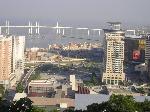
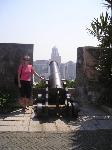
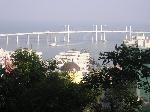
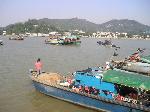
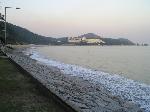
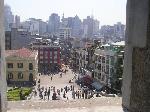
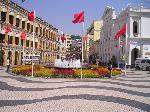
 Copyright © 1998-2026 All rights reserved.
Copyright © 1998-2026 All rights reserved.